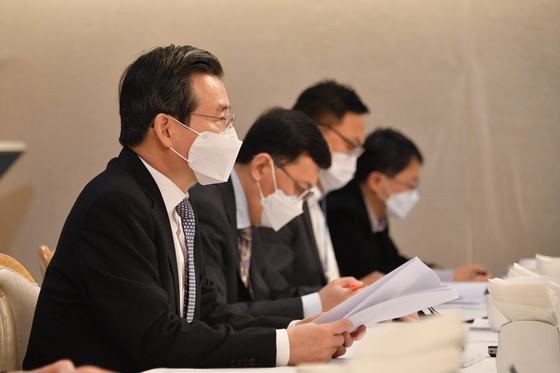Although the export manufacturing industry is booming, it has not led to a recovery in domestic demand. Money (liquidity) that has been released a lot on the market is fueling the risk of inflation. This is the diagnosis of the Ministry of Strategy and Finance on the 19th.
On this day, the Ministry of Science and Technology said in a report on the’Recent Economic Trends (Green Book)’, “Recently, Korea’s economy has improved manufacturing and investment thanks to the recovery of exports. The situation continues and the uncertainty in the real economy continues, with the employment index slowing significantly.”

Kim Yong-beom, the 1st Vice Minister of the Ministry of Strategy and Finance (left), all remarked at the ‘6th Innovation Growth Strategy Review Meeting, Policy Review Meeting, Korea Edition New Deal Inspection TF Meeting and the 3rd Vice Minister for Price Relations’ held at the Government Complex in Jongno-gu, Seoul on the 19th. Are doing. Provided by the Ministry of Strategy and Finance = News 1
Exports in January of this year increased by 11.4% compared to a year ago, and production in the mining industry (3.4% compared to the previous year) and facility investment (5.3%) are also surviving. However, production in the service sector (-2.2%) and retail sales (-2.0%) are still sluggish. The same goes for construction investment (-2.5%). This means that the recovery trend centered on export manufacturing is not leading to the domestic economy.
Kim Yong-beom, the 1st Vice Minister of the Ministry of Technology, made a similar diagnosis. Presiding at the policy review meeting on this day, “The question of’Can a stable economic environment be maintained’ still has a question mark,” he said. “There are always concerns about potential risk factors for financial stability, such as the gap between the real economy and asset price movements. I said.
The bottom line is still cold, but only the financial market is boiling. Deputy Minister Kim said, “The debate over how abundant liquidity will work amid the slow recovery from the Corona 19 crisis leads to concerns about inflation (high prices).” “The government is committed to ensuring that the question mark created by the crisis becomes a natural exclamation point again. I will not delay it.”
In relation to the soaring inflation, the government will come up with additional measures. Deputy Minister Kim said, “Since the New Year, prices of agricultural and livestock products have stabilized downward in apples and pears, but some items such as eggs are still strong and are showing a high overall level.” “Recently, not only agricultural and livestock products, but also crude oil and non-ferrous metals, etc. As raw material prices continue to be strong, the government will strengthen monitoring by sector such as grain and crude oil, and prepare countermeasures through inflationary vice-ministers meetings.”
Meanwhile, at the policy review meeting on the same day, the status of digitization of the National Safety Infrastructure (SOC) was discussed. The government will spend 1.4 trillion won (10 trillion won in national expenditure) by 2025 to apply technologies such as artificial intelligence (AI) to national infrastructure such as roads, railroads, airports and rivers.
It is the content of constructing an intelligent transportation system (ITS, C-ITS) that provides real-time information on surrounding traffic conditions and accident risk on major arterial roads, and adding a smart management system that enables constant inspection on metropolitan metropolitan railways and Gyeongbu high-speed railways. By next year, a non-face-to-face check-in system using biometric information will also be installed at 15 airports nationwide.
Sejong = Reporter Cho Hyun-sook [email protected]
